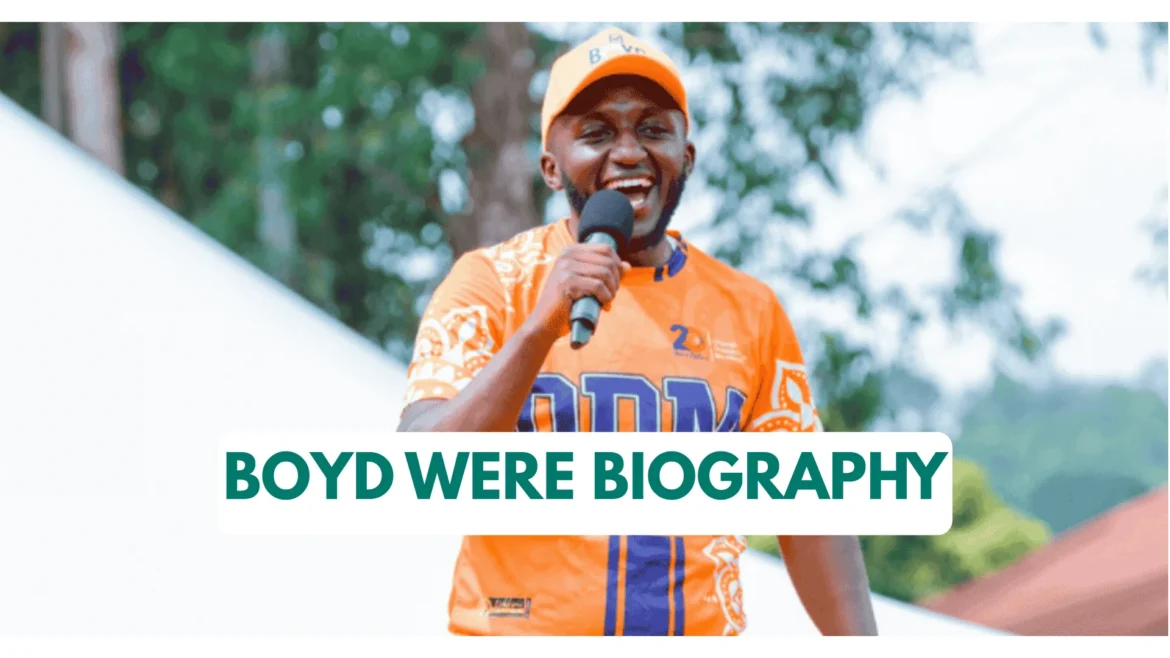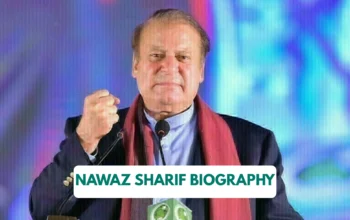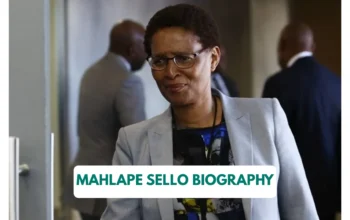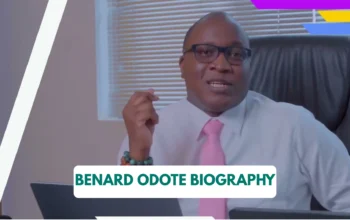Boyd Were is a young Kenyan figure who has attracted national attention as the son of the late Kasipul MP Charles Ong’ondo Were.
Over the last year he has moved from a background in finance and public service into the political spotlight, driven by family legacy, education in finance, and an ambition to serve his home constituency.
This biography unpacks his life, background, education, career, and political aspirations — and offers answers to the questions people most often ask about him.
Bio Data
- Full Name: Boyd Were
- Born: 22 April 1998
- Age: 27 (as of 2025)
- Nationality: Kenyan
- Occupation: Politician; formerly an officer at the Kenya Revenue Authority (KRA)
- Parents: Son of the late Charles Ong’ondo Were
- Net Worth: Not publicly disclosed / unknown.
Early life and family background
Boyd Were grew up in a politically active family in Homa Bay County. His father, Charles Ong’ondo Were, served as the Member of Parliament for Kasipul and was a well-known local leader; the elder Were’s career and tragic death have shaped Boyd’s public profile and political trajectory. Growing up in that household exposed Boyd to the realities of constituency service and local leadership from an early age — an influence he cites as formative in interviews and profiles.
Education
Education is central to Boyd’s story. He completed a Bachelor of Science in Finance from the Cooperative University of Kenya — a background that gave him technical grounding in finance and public resource management. Several profiles also report that he enrolled in postgraduate studies in commerce (Finance and Investment) at KCA University, reflecting a continuing commitment to deepen his expertise before or while entering public life. That combination of practical and academic training is frequently highlighted in coverage about his suitability for public office.
Professional career: KRA and finance
Before his emergence as a political candidate, Boyd worked as an officer at the Kenya Revenue Authority (KRA). This public-sector finance experience positioned him as someone who understands government systems, revenue collection, and public-sector accountability — credentials that supporters argue are useful for constituency budgeting and oversight. His experience at KRA, together with his academic background, is often presented in media profiles as a major asset.
The political turning point
The turning point in Boyd’s public life was the assassination of his father in April 2025, an event that sent shockwaves through Kasipul and Homa Bay County. In the months that followed, local political dynamics shifted as party leaders, constituents, and civil society discussed continuity, legacy, and leadership replacement. Boyd soon featured in media coverage as one of the family members considered to continue Charles Were’s work, a narrative reinforced by ODM party discussions and local opinion. These developments brought Boyd from relative professional privacy into the center of local politics.
Political positioning and public image
Boyd’s public image is a mix of legacy candidate and educated technocrat. Supporters emphasize his youth, academic grounding in finance, and connection to his father’s legacy. Critics or cautious observers note his relative youth and limited political track record, which they say will be tested in elections and in the practical work of constituency service. Media profiles and community commentary illustrate both the energy behind his candidacy and the high expectations placed on him to balance legacy with fresh ideas.
Campaigns, primaries, and by-election dynamics
Following the death of his father, local party structures — particularly within the ODM party — signaled support for keeping the seat within the late MP’s family, a position that advantaged Boyd’s bid for the Kasipul seat. Coverage through 2025 documented primary contests, community rallies, and local negotiations as Boyd sought to secure party endorsement and voter confidence. The by-election environment in Kasipul has been described as emotionally charged, with many voters motivated by loyalty to the late MP and hopes for competent representation.
Leadership style and priorities
Based on interviews, campaign messaging, and his professional background, Boyd’s stated priorities center on fiscal responsibility, youth empowerment, and building on development projects associated with his father’s term. His finance training is frequently highlighted as steering him toward policies that emphasize transparent budgets, revenue mobilization for local projects, and investment in education and youth entrepreneurship. Local analysts see his mix of technical skills and lineage as a potential bridge between technocratic governance and community expectations.
Personal life and character
Public information about Boyd’s private life focuses mainly on his family connections and public role; like many emerging politicians, he keeps personal details relatively private while foregrounding public service. Media portraits emphasize humility, pragmatic thinking, and a readiness to learn — traits that supporters say mirror his father’s reputation. Because he is young and building a public record, many elements of his life are still being documented by local press and community sources.
What supporters and critics say
Supporters: They praise his education, KRA experience, and the stability that continuity with his father’s agenda would offer. They argue Boyd brings modern technical skills to a constituency that can benefit from better financial management.
Critics / skeptical voices: They caution that youth and inexperience can be limiting, and that lineage alone doesn’t guarantee effective governance. They emphasize the need for demonstrated policy results and accountability once elected.
Both perspectives are common in profiles and editorial coverage and reflect the complex expectations for new leaders in Kenyan constituencies.
Where he stands now (as reported)
As of the latest mainstream media reporting in 2025, Boyd had been widely discussed as a leading family candidate for the Kasipul parliamentary seat and had been active in party and local engagements. Media coverage in August–September 2025 documented his education, career, and growing public profile, while the local political calendar continued to evolve. Readers should check the latest, local election reporting for the most current status of any election results or official appointments.
FAQs
Who is Boyd Were?
Boyd Were is a Kenyan young leader and public official — son of the late Kasipul MP Charles Ong’ondo Were — known for a background in finance and a public-sector role at KRA.
When was he born / how old is he?
Media profiles report Boyd’s birth year as 1998, making him in his mid-20s in 2025 (reports cite April 22, 1998 in some coverage).
What is his education?
Boyd has a Bachelor of Science in Finance from the Cooperative University of Kenya and has been reported to be pursuing a Master’s in Commerce (Finance & Investment) at KCA University.
What did he do professionally before politics?
He worked as an officer at the Kenya Revenue Authority (KRA), giving him experience in public finance and revenue systems.
Is he an elected MP?
As of the latest verified mainstream articles through late 2025, he had been discussed as a leading candidate and public figure in Kasipul; for confirmed election outcomes, consult up-to-date local election reporting and IEBC announcements.
What are his political priorities?
Reported priorities include fiscal responsibility, youth empowerment, continuity of constituency projects, and investment in education and local enterprise.
Conclusion
Boyd Were represents a contemporary pattern in Kenyan politics: a younger, educated professional stepping into the public arena partly through family legacy but also through his own technical credentials. Whether he will fulfil the high expectations placed on him will depend on electoral outcomes, his ability to convert financial expertise into impactful constituency projects, and how he balances legacy with innovation. For readers following Kenyan local politics, Boyd’s rise is a case study in how education, public-sector experience, and family heritage can combine to shape an emerging political career. Stay tuned to reputable local outlets for the most current updates on his political journey.




